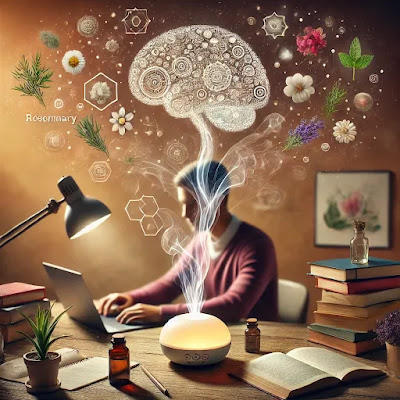Aromatherapy and Memory: Scents That Boost Brain Power
Aromatherapy and Memory Scents That Boost Brain Power - Aromatherapy, the practice of using essential oils for therapeutic benefits, has been widely studied for its effects on brain function, memory retention, and cognitive performance. Certain scents have been found to enhance concentration, reduce stress, and improve memory recall. By incorporating specific essential oils into daily routines, individuals can optimize brain power naturally.
How Aromatherapy Affects Memory and Cognitive Function
1. Stimulates the Limbic System 🧠
The limbic system, which governs emotions, learning, and memory, is directly influenced by scent.
Certain aromas trigger neural responses that enhance focus and recall.
2. Improves Oxygen Flow to the Brain 💨
Inhaling essential oils can increase oxygen supply to the brain, improving cognitive function.
Enhanced blood circulation contributes to better memory and mental clarity.
3. Reduces Stress and Anxiety 😌
Stress is a major factor in memory loss and cognitive decline.
Aromatherapy helps lower cortisol levels, promoting relaxation and mental focus.
4. Enhances Sleep Quality 💤
Sleep plays a crucial role in memory consolidation.
Essential oils like lavender aid in restful sleep, allowing the brain to process and store information efficiently.
Best Essential Oils for Boosting Memory and Brain Function
1. Rosemary 🌿
Known as the "memory herb," rosemary has been shown to enhance cognitive performance and memory recall.
Studies suggest that inhaling rosemary essential oil improves speed and accuracy in mental tasks.
2. Peppermint 🍃
Peppermint is a natural stimulant that boosts alertness and concentration.
It enhances problem-solving abilities and mental clarity.
3. Lemon 🍋
Lemon essential oil uplifts mood and increases focus.
The refreshing scent helps combat mental fatigue and brain fog.
4. Lavender 💜
While typically associated with relaxation, lavender also supports memory retention by reducing stress and improving sleep.
It is beneficial for students and professionals who need to absorb large amounts of information.
5. Sage 🌱
Sage essential oil is rich in compounds that enhance cognitive function and protect against neurodegenerative diseases.
It supports long-term memory and learning ability.
6. Eucalyptus 🌲
Eucalyptus stimulates brain activity and improves concentration.
It is useful for increasing alertness during study or work sessions.
7. Cinnamon 🌰
Cinnamon essential oil boosts attention span and enhances cognitive processing speed.
Its warming aroma also reduces mental fatigue.
How to Use Aromatherapy for Memory Enhancement
1. Diffusing Essential Oils
Use an aromatherapy diffuser to disperse memory-boosting scents into the air.
Ideal for study spaces, work environments, or relaxation areas.
2. Direct Inhalation
Place a few drops of essential oil onto a tissue or cotton ball and inhale deeply.
This provides immediate cognitive benefits and mental clarity.
3. Applying to Pulse Points
Dilute essential oils with a carrier oil and apply to wrists, temples, or behind the ears.
This method ensures prolonged absorption and brain stimulation.
4. Using in a Bath or Shower
Add a few drops of essential oil to bathwater for relaxation and improved memory retention.
Alternatively, apply oil to shower walls to create an invigorating steam.
5. Incorporating into Study or Work Routines
Apply essential oils to a diffuser or personal inhaler while reading or working on cognitive tasks.
Associating a specific scent with study sessions can improve recall during exams or presentations.
Conclusion
Aromatherapy is a natural and effective way to enhance memory, boost concentration, and support cognitive function. By using essential oils like rosemary, peppermint, lemon, and sage, individuals can stimulate brain activity, reduce stress, and improve long-term recall. Whether through diffusion, inhalation, or topical application, integrating these scents into daily life can lead to sharper focus and stronger memory retention.




















